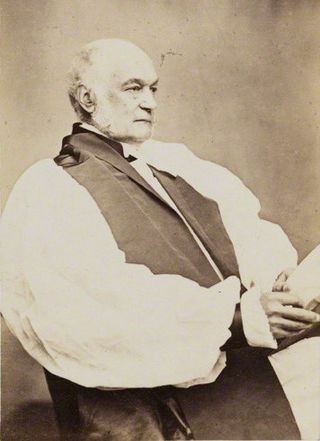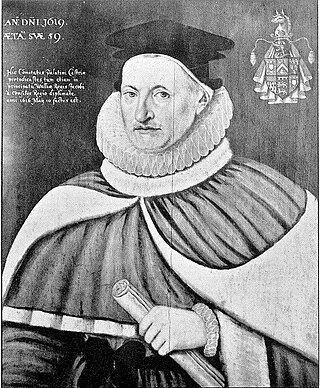
The Keeper or Master of the Rolls and Records of the Chancery of England, known as the Master of the Rolls, is the President of the Civil Division of the Court of Appeal of England and Wales and Head of Civil Justice. As a judge, the Master of the Rolls is second in seniority in England and Wales only to the Lord Chief Justice. The position dates from at least 1286, although it is believed that the office probably existed earlier than that.

Sir Bulstrode Whitelocke was an English lawyer, writer, parliamentarian and Lord Keeper of the Great Seal of England.

Sir James Whitelocke SL was an English judge and politician who sat in the House of Commons between 1610 and 1622.

Sir Hardress Waller was born in Kent and settled in Ireland during the 1630s. A first cousin of Parliamentarian general William Waller, he fought for Parliament in the Wars of the Three Kingdoms, becoming a leading member of the radical element within the New Model Army. In 1649, he signed the death warrant for the Execution of Charles I, and after the Stuart Restoration in 1660 was condemned to death as a regicide.

George Moberly was an English cleric who was headmaster of Winchester College, and then served as Bishop of Salisbury from 1869 until his death.
John Fry (1609–1657) was a Member of the English Parliament and sat as a Commissioner (Judge) during the trial of King Charles I of England.

Sir Thomas Chamberlayne, SL was an English judge who served as Chief Justice of Chester during the reign of James I of England.
Edmund Harvey or Hervey (c.1601–1673) was an English soldier and member of Parliament during the English Civil War, who sat as a commissioner at the Trial of King Charles I and helped to draw up the final charge. Although present on 27 January 1649 when the death warrant was signed he did not add his signature.
Early in the First English Civil War the Long Parliament threatened to retaliate in kind if the Royalists tried and executed John Lilburne and two other Parliamentary offices for treason. Lilburne later described this as the declaration of Lex Talionis, and it brought about a practical—rather than moral—mutual restraint by the parties to the war on how they treated prisoners of war.

Justice of the Common Pleas was a puisne judicial position within the Court of Common Pleas of England and Wales, under the Chief Justice. The Common Pleas was the primary court of common law within England and Wales, dealing with "common" pleas. It was created out of the common law jurisdiction of the Exchequer of Pleas, with splits forming during the 1190s and the division becoming formal by the beginning of the 13th century. The court became a key part of the Westminster courts, along with the Exchequer of Pleas and the Court of King's Bench, but with the Writ of Quominus and the Statute of Westminster, both tried to extend their jurisdiction into the realm of common pleas. As a result, the courts jockeyed for power. In 1828 Henry Brougham, a Member of Parliament, complained in Parliament that as long as there were three courts unevenness was inevitable, saying that "It is not in the power of the courts, even if all were monopolies and other restrictions done away, to distribute business equally, as long as suitors are left free to choose their own tribunal", and that there would always be a favourite court, which would therefore attract the best lawyers and judges and entrench its position. The outcome was the Supreme Court of Judicature Act 1873, under which all the central courts were made part of a single Supreme Court of Judicature. Eventually the government created a High Court of Justice under Lord Coleridge by an Order in Council of 16 December 1880. At this point, the Common Pleas formally ceased to exist.

The position of Dean Ireland's Professor of the Exegesis of Holy Scripture was established at the University of Oxford in 1847. This professorship in the critical interpretation or explanation of biblical texts, a field known as exegesis, was instituted by John Ireland, who was Dean of Westminster from 1816 until his death in 1842. He founded scholarships in his lifetime at the University of Oxford, which are still awarded after an examination to undergraduates "for the promotion of classical learning and taste". In his will, he left £10,000 to the university, with the interest arising to be applied to the professorship. The first professor, Edward Hawkins, was appointed in 1847. The second Dean Ireland's Professor, Robert Scott, had won an Ireland scholarship in 1833 while studying at Christ Church.

SirEdmund Widdrington Byrne was a British judge and Conservative Party politician.

Colonel Nathaniel Rich was a member of the landed gentry from Essex, who sided with Parliament during the Wars of the Three Kingdoms. He has been described as "an example of those pious Puritan gentlemen who were inspired by the ideals of the English Revolution".
Sir Thomas Raymond or Rayment was a British judge. Born to Robert Raymond in Bowers Gifford, he was educated at a school in Bishop's Stortford before matriculating to Christ's College, Cambridge on 5 April 1643. On 6 February 1645 he joined Gray's Inn, being called to the Bar there on 11 February 1651. In October 1677 he became a Serjeant-at-Law, before being appointed a Baron of the Exchequer on 1 May 1679 and knighted on 26 June. On 7 February 1680 he became a Justice of the Common Pleas, and on 24 April 1680 transferred to the Court of King's Bench. He died on 14 July 1683, leaving behind a set of law reports titled Reports of divers special cases adjudged in the courts of king's bench, common pleas, and exchequer in the reign of King Charles II, which were published in 1696, 1743, 1793 and 1803. His son, Robert Raymond, also later became a judge.
Samuel Browne, of Arlesey, Bedfordshire, was Member of Parliament during the English Civil War and the First Commonwealth who supported the Parliamentary cause. However he refused to support the trial and execution of Charles I and, along with five of his colleagues, resigned his seat on the bench. At the Restoration of 1660 this was noted and he was made a judge of the Common Pleas.

Sir James Hales was an English judge from Kent, the son of the politician and judge John Hales. Though a Protestant, he refused to seal the document settling the crown on the Protestant claimant Lady Jane Grey in 1553, and during the following reign of the Catholic Queen Mary opposed the relaxation of the laws against religious nonconformity. Imprisoned for his lack of sympathy to Catholicism and subjected to intense pressure to convert, in a disturbed state of mind he committed suicide by drowning. The resulting lawsuit of Hales v. Petit is considered to be a source of the gravediggers' dialogue after Ophelia drowns herself in Shakespeare's play Hamlet.
John Parker was an English judge during the Interregnum.

Whitelocke Bulstrode (1650–1724) was an English official, religious controversialist and mystical writer.












